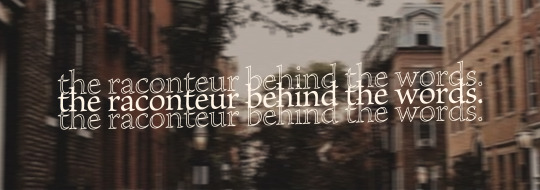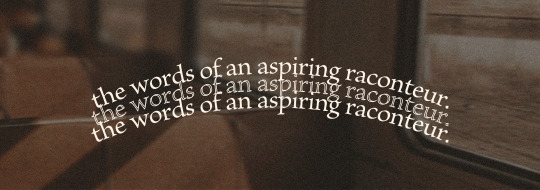Text
the raconteur principle is an ever-evolving theory of how to become the narrator who excels in telling their anecdotes. perhaps, through these pages, both of us get to discover the words hiding within us.
0 notes
Text
𝒕𝒉𝒆 𝒓𝒂𝒄𝒐𝒏𝒕𝒆𝒖𝒓 𝒉𝒆 𝒖𝒔𝒆𝒅 𝒕𝒐 𝒃𝒆.
In the corner of his bedroom sits the seventeen-year-old boy banging his head on his laptop, trying to reach deep from within him the words he needs. Meet Riel, the failing writer. For the majority of his life, ink coursed through his veins. He used to craft meticulous universes and sensible narratives with ease and confidence. Years later, he stares at his hands, wondering why no ink is coming out. The then wide-eyed and passionate writer has dwindled and dried out. Now, he dreams of nothing but to revive, to cross paths again with the raconteur he used to be.
0 notes
Text
𝒕𝒉𝒆 𝒋𝒐𝒖𝒓𝒏𝒆𝒚 𝒕𝒐 𝒃𝒆𝒄𝒐𝒎𝒊𝒏𝒈 𝒕𝒉𝒆 𝒓𝒂𝒄𝒐𝒏𝒕𝒆𝒖𝒓.
They say that the number 13 reeks of bad luck. However, HMSS113 was anything but unfortunate. One of the subjects I needed to complete my Senior High School education was HMSS113: Creative Nonfiction. But writing was something that I had drastically lost confidence in doing. Thus, upon first hearing that I needed to take a writing subject, fears and doubts trampled my being. However, after five months of wallowing in ink, words, sentences, and blurbs, I emerged with a rekindled flame in my heart and new perspectives and realizations.
Among these was realizing that writing is a delicate art that needs time and patience. For the longest time, I envied those who had no problem writing meters of words in one sitting while I took hours to complete one paragraph. However, throughout this process, I learned that one should never rush their craft, affirming that it was okay to write at my own pace. Writing had no deadline (albeit in school settings, there are), nor is it a race between writers. What mattered most was that I was able to express myself in the manner I desired. And now that I was comfortable with the pace at which I wrote, I naturally came to love, or perhaps learn to love again, the other aspects of my writing.
By the end of the course, it occurred to me that maybe, just maybe, I had the capacity to become the raconteur I yearn to be.
0 notes
Text
𝒕𝒉𝒆 𝒕𝒉𝒓𝒆𝒆 𝒕𝒊𝒎𝒆𝒔 𝒕𝒉𝒂𝒕 𝑨𝒕𝒍𝒂𝒔 𝒉𝒆𝒂𝒓𝒔 𝒕𝒉𝒆 𝒘𝒐𝒓𝒅 “𝒃𝒊𝒕𝒂𝒘"
❝ no one can write
with their eyes closed
thus, what sense would it make
if writers stay confined within the pages?
— 𝗮𝗻 𝗮𝗻𝗻𝗼𝘁𝗮𝘁𝗲𝗱 𝗹𝗶𝘁𝗲𝗿𝗮𝗿𝘆 𝗽𝗶𝗲𝗰𝗲.
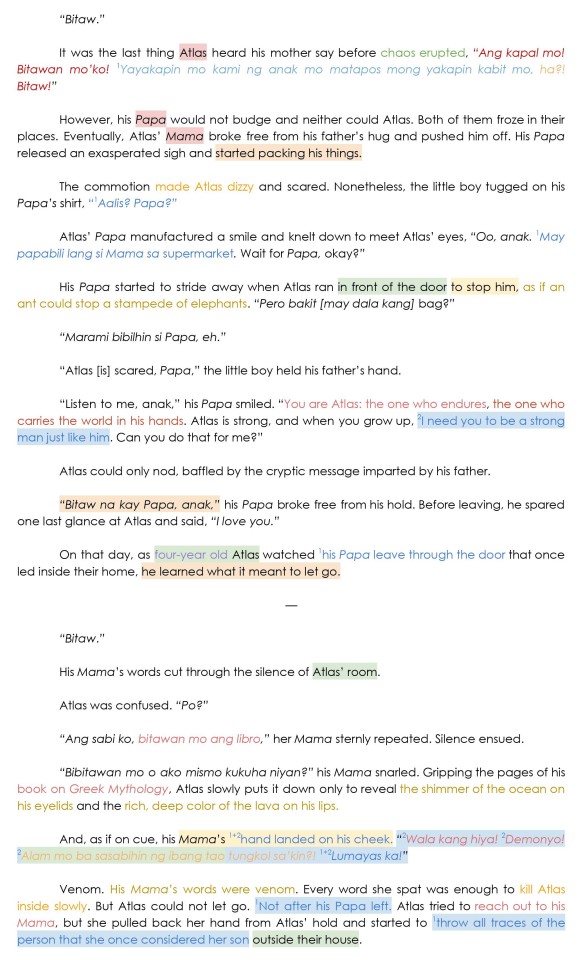
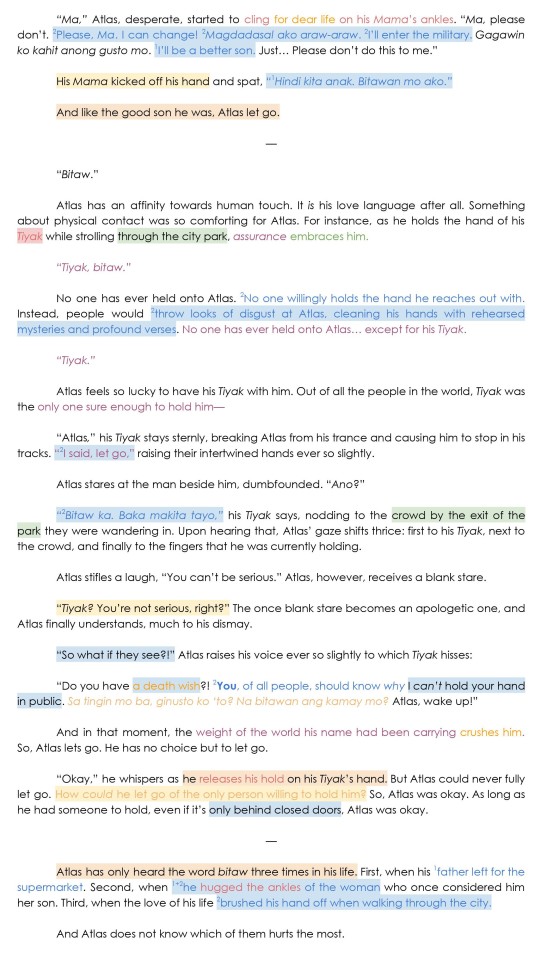
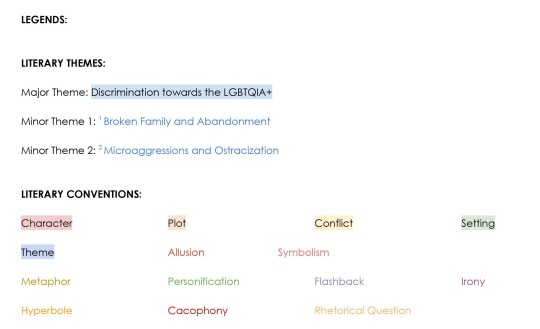
0 notes
Text
𝒍𝒊𝒇𝒆 𝒕𝒐𝒍𝒅 𝒕𝒉𝒓𝒐𝒖𝒈𝒉 𝒕𝒉𝒆 𝒍𝒆𝒏𝒔
❝ if a picture can paint
a thousand words,
why can't i?
— 𝗮 𝗹𝗶𝘁𝗲𝗿𝗮𝗿𝘆 𝗿𝗲𝗽𝗼𝗿𝘁𝗮𝗴𝗲.
NARINIG
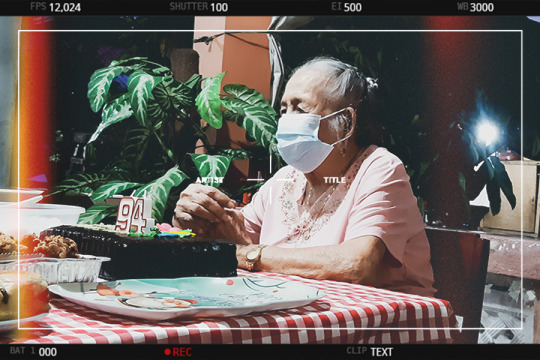
Gratitude traces the face of Clotilde Buena as she celebrates her 94th year on June 3, 2021, in her residence. Since her hearing had turned defective, friends and family ensured their love remained loud. When asked about her secret to long life, she chuckled, "unwavering faith and balanced meals."
NAKASALAMUHA

Under the scorching November heat, Neo (L), Yeshua (C), & Sam (R) huddle outside the 7-11 to document their first meetup after two years. The encounter was short, awkward, but memorable. On their phones were friends Pat (C) & Nica (R), while Neo's blank screen balanced the way of life.
NANGAMBA

Tension paralyzes Claude (L), Penelope (C), & Neo (R) while waiting for the results of the St. Paul's Bible Quiz Regional Finals on October 24, 2019, in SM Legazpi. Eventually, they were named second placers. Nonetheless, they went home fulfilled, with a happy heart and a box of J.CO donuts.
NAPAGHABI
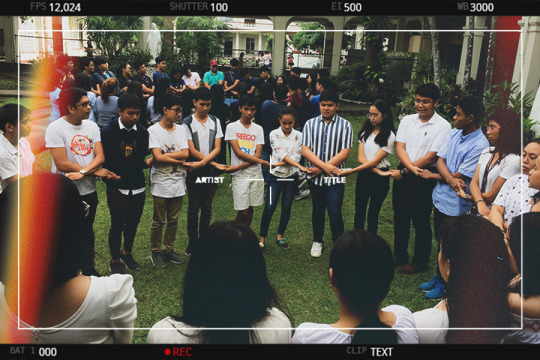
Adrenaline courses through the veins of the debaters representing Ateneo de Naga JHS, contrasting the gloomy morning of August 24, 2019, as they perform their pre-tournament ritual for Raul Roco Cup XIII in Universidad de Sta. Isabel. Members shared heartfelt and motivational messages. Hand-in-hand, they fought hard until the end.
0 notes
Text
𝒘𝒉𝒆𝒏 𝒕𝒉𝒆 𝒘𝒊𝒏𝒅𝒐𝒘𝒔
❝ in the corners of my home,
i sometimes find dead words
and as i speculate on who the culprit may be,
a dead memory starts haunting me.
— 𝗮 𝗺𝗶𝗰𝗿𝗼𝗺𝗲𝗺𝗼𝗶𝗿.
I’ve always hated the windows of our home.
They were these old, traditional, worn out structures that were kept in place by a lock and had opaque glass, meaning the only way I could see outside is if I opened the windows themselves. And upon doing so, the windows revealed nothing but the barren street, the weeds in the garden, and the withered plants: a mundane and uninteresting view. So, as a child, I naturally avoided them at all costs.
Contrary to this, my family believed in the goodness of windows. They took pride in their belief that opening windows meant welcoming positivity into our lives. And as the youngest in the household, it became my duty to open them every morning since they said that I needed to greet the blessings more than anyone, whatever that meant.
So, like the obedient child I was, I did. Every morning, after I wake up and say my graces, I would drag my feet to our living room and open all the windows. At first, it was exciting for the naive child, but as time passed, it became redundant and burdening. So much so that I wished that I woke up one day to see that the windows had already opened themselves. And to my surprise, I did.
As I was groggily and slowly walking to our living room, I was (pleasantly) surprised to see that the windows were already open. “Wow, magic! Naririnig ba ako ng mga bintana?” I thought to myself. Driven by such excitement, my first instinct was to run up to the windows to thank them. But before I could utter a word, I made eye contact with a tall, middle-aged man standing outside our gate, clinging onto the steel bars as if he was a new inmate who had just been ushered into his prison cell.
Normally, whenever the windows showed me a person behind our gates, I would run around the house, enthusiastically screaming: “Bisita! May bisita!” However, this time around, I couldn’t fathom speaking nor moving. Instead, I continued looking at him, looking into his eyes. And the longer I looked at him, the more my heart stung. The longer I stared into his eyes, the more tears streamed down my face. The longer I stared deep into his eyes, the more I was moved to approach him. And I wanted to approach him, but fear consumed my heart.
So, I waited. I waited for a sign, for any assurance, that he wanted me to come to him. But, he gave nothing. Instead, I see my mother rushing outside, while a different pair of arms grabbed me from behind. And in that moment, as they took me away from the windows, away from the stranger, the heart that once swelled sank and shattered.
Since that day, we rarely opened our windows anymore. And I never understood why. Whenever I would ask who he was, my family would brush him off as a stranger, someone foreign, someone they did not know. But I knew deep down that he wasn’t a stranger, despite the fact that I knew nothing about him. However, they would never tell me the truth.
So, I turned to our windows. Every now and then, I would open them in hopes of catching a glimpse of the stranger. But, I never did. I would ask my windows if perhaps someone has been here. But, they never gave me an answer. Eventually, it became clear that the stranger was never coming back. So, I stopped. I stopped opening the windows every morning. I stopped waiting like a dog whose owner has been away for so long. I stopped asking the stoic windows questions that I was never going to hear the answers to. But, I never stopped yearning.
Years later, I started opening my windows again. Perhaps to relish in the warm sunlight basking from the skies. Or perhaps to welcome positivity and blessings into my life, as my family would put it. Or perhaps to still see if someone is knocking at my door. Someone who wants to ask for forgiveness. Someone who yearns to reconcile with his child.
I continue to open the windows because maybe, just maybe, I’d be able to see my father again.
0 notes
Text
𝒄𝒐𝒏𝒇𝒐𝒓𝒎𝒊𝒏𝒈 𝒕𝒐 𝒅𝒆𝒇𝒊𝒂𝒏𝒄𝒆
❝ they say:
writing reveals the fragments
of the soul, of the being
but how about those who've no idea who they are?
— 𝗮 𝗰𝗵𝗮𝗿𝗮𝗰𝘁𝗲𝗿 𝘀𝗸𝗲𝘁𝗰𝗵.
“A part of me is defiant talaga. I will not be governed. I will not be made to follow.”
Witnessing her firm yet casual declaration of assertion against the oblivion of chaos binding all of us was like downing a cup of coffee in one go. Every sip, every word was exhilarating: enough to wake sleeping hearts and feed the flames of those already awake. And amidst the adrenaline coursing through the veins of those who relish the strong flavor of her words, she maintains an effortless poise as she leans back and takes a sip of her pineapple juice (because she’s ironically trying to cut down her caffeine intake), occasionally flirting with her girlfriend lying beside her off-screen, as she waits for the next question.
Talking to Ms. Dessa Anne P. Binaday, more affectionately known by her students as Ma’am Sheng, felt natural. Awkwardness wouldn’t dare to make its presence known in a room being illuminated by her warm and inviting smile, an array of memes and jokes, and a quirky and diverse range of facial expressions (as if an actress training her whole life). But unlike actresses with roles to fill and personas to fabricate, Ma’am Sheng remains authentically and unapologetically herself in everything she does. Amidst the fun and “chill vibes,” as she would put it, she manages to showcase her expertise with ease, remaining resolute in her advocacies and determined to immerse the students in the reality beyond the four corners of the virtual classroom. She is “beautiful defiance” personified, and it all begins with her name.
There’s a reason why “introduction” begins with the letter “I”
Upon first entering the world, our family immediately bestows upon us (rather forcibly) a name, making it one of the first inheritances we receive from our parents during our lifetime. And although this is not an act inherently tainted with malice, instances arise wherein the name we receive has become reductive of the essence of our persona. Our name, after all, is one of the hallmarks of our identity: it is how we primarily present ourselves to the world. Thus, actively choosing to use a different name that resonates more with her true self was the first of her many admirable defiances.
What started as a cute and random nickname picked out by her grandmother became a reclamation of her identity. According to her, "being Sheng kasi allows me to find who I am within my own bounds but, at the same time, allow other people to know me pa… if that makes sense. When I tell people na ako si Sheng, I allow them to be more intimate in a way kasi it's a name [that] I have chosen for myself. This is who I choose to be and this is who I want to be known in the world." And that she did: she managed to, with full conviction, craft and reclaim the narrative that she wanted the world to see. Now, people know her as Ma'am Sheng: the chill, funny, supportive, and kind-hearted Humanities and Social Sciences teacher taking up a degree in Philosophy. But before there was philosophy, there was religion.
Listen to the heart, the thing that is keeping you alive
As Karl Marx would put it: “Religion is the opium of the people.” And Ma’am Sheng, like many other Filipinos, was born in a household whose walls whispered cryptic verses, hummed grandiose melodies, and preached hypocritical sermons. She attests that: all her life, she has drowned in the opium of Catholicism, having attended Catholic schools only. So, it then made sense that her first course was AB Religious Education: it made sense to everyone else but her. She knew deep inside that her heart yearned for Philosophy, but she couldn’t because “it’s something that good Catholic girls shouldn’t do.” However, it was only a matter of time before her knees gave out upon kneeling for so long. And the moment that her knees left contact with the floor, the only option left was for her feet to flee, to show defiance.
So, she did. Upon leaving her scholarship and course at her previous school, she took to Ateneo de Naga University to pursue Philosophy (though it was a thorny road before she finally got to pluck the rose). Nonetheless, she persisted, and now, years later, she takes time out of her day to gush about her immense happiness in and passion for Philosophy. When asked how such a strong affinity developed, she testifies to the eye-opening and mind-bending nature of the course. Philosophy was the fertilizer for the growing branches of her values, principles, soul, and persona. And in the process, she alludes to the different mentors and teachers who helped her and continue to help her actualize the best version of herself. She affirms that “mentors are essential,” dubbing it as one of her philosophies in life. And from being inspired by other teachers, she now gets to inspire her own students.
Reach for yourself whenever you reach for the stars
"I like teaching." In the span of three words, Ma'am Sheng managed to articulate years of accumulated experience and bubbling passion for her profession. Society often obsesses over the deeper meaning behind every decisive action, but she remarks that "sometimes, you just have to like something." Once again, defying the perceived need to prove herself to society. But for a while, the poised and laid-back aura crumbles as she concedes to her humanity: "Aminon ta na… nagtutukdo ako kasi I have this sense of self-grandiosity." However, she appeases that by saying that her students will always shine more than her: "You are meant to surpass me. You are meant to be better than me, and it's an honor to be able to see that." She retorts that the paths teachers pave exist for the students to ruin for them to shine even brighter. And when her students shine, she also basks in the light they emulate: "when you shine, nabubuhusan man ako kang light."
Let the ink drift you away
Ma’am Sheng has a way with words: they seem to come naturally to her, as if bees to a field of flowers. So, it came as a pleasant surprise to know that she had a writing blog. Albeit, she laments that it’s been a while since she visited the world of literature. However, she attests to the role that writing played in her life. Writing was all she had back then, which led her to defy all conventions. She reminisced on how she used to write manically, letting her misery fuel her art. When writing, she surrenders herself to the will of the pen. Perhaps, in the same way, words come naturally to her because she awaits them. And after she finishes, she never edits her piece nor goes back to it. She simply lets it exist. But despite her love for writing, she never perceived it as a sustainable course since misery was her muse, and she could not bear the thought of facing that weight everyday. Although Ma’am Sheng never considered pursuing writing as a profession, her sentiments about it being a cathartic journey of discovering the self tugged at my heartstrings. She reassures me by saying that I should start with what I like. And, as of this moment, I like writing, and perhaps that’s all the reason I need.
Defying is such sweet sorrow
In the end, her unwavering commitment to achieving social justice through her profession, never-ending passion for her craft, and naturally-unfolding wisdom render Ma’am Sheng an inspiration to many, including myself. And as someone whose path to defiance is just starting (by choosing literature as a course amidst generations of corporate jobs and breadwinners), it was reassuring to know that defiance blooms. She parts with a message encouraging us to be open to defiance, both from others and even to the self. She remarks that it takes something great and something deep in us to defy our sense of self, but it will all be worth it in the end. It may be scary, but I take Ma'am Sheng's word for it. I mean, there’s only one way to find out. It’s time to conform to defiance.
1 note
·
View note
